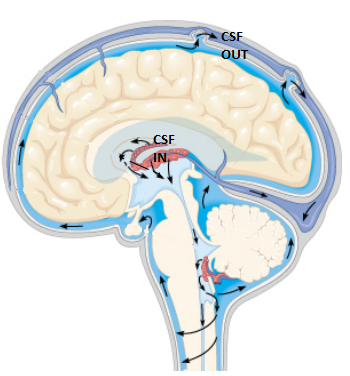Idiopatic Intracranial Hypertension (IIH), also called Pseudotumor Cerebri, is a rare disease prevalent in obese women of child-bearing age. It is characterised by high pressure in the brain for no obvious reason. The patient will show serious symptoms such as severe headaches and visual problems, which can drastically decrease their quality of life. For now, the only definitive treatment is weight loss, which can take several weeks before any improvement in the patient can be seen.
IIH: inside the brain
 Cross section of the brain showing the CSF pathway inside the brain. CSF IN = Secretion of CSF. CSF OUT = Drainage of CSF
The brain is surrounded by a liquid called Cerebrospinal Fluid (CSF) which protects it and acts as a cushion. However, if there is an excess of CSF, the pressure inside the skull will increase. This can lead to severe problems and symptoms – this is what happens inside of an IIH patient’s head. The reason why there is an excess of CSF in this disease is not yet known. While this is not a life threatening condition, the symptoms can include severe headache and vision loss. This can have a big impact on the patient quality of life. Currently there is no permanent and fast-acting treatment available.
Cross section of the brain showing the CSF pathway inside the brain. CSF IN = Secretion of CSF. CSF OUT = Drainage of CSF
The brain is surrounded by a liquid called Cerebrospinal Fluid (CSF) which protects it and acts as a cushion. However, if there is an excess of CSF, the pressure inside the skull will increase. This can lead to severe problems and symptoms – this is what happens inside of an IIH patient’s head. The reason why there is an excess of CSF in this disease is not yet known. While this is not a life threatening condition, the symptoms can include severe headache and vision loss. This can have a big impact on the patient quality of life. Currently there is no permanent and fast-acting treatment available.
What do we know about IIH?
Getting to know the molecular and cellular reasons behind this increase of pressure would open new opportunities to find targets for novel and efficient therapies. There is some evidence to suggest that an imbalance in the rate of secretion and rate of drainage of CSF can cause an excess of CSF and an increase in pressure. A diet rich in fat has been shown to be the main characteristic which would lead to an increase of CSF secretion and a decrease of CSF drainage, and this affects females to a greater extent.
Current project
Our work is focused on exploring the following question: “why do females on a high fat diet show a higher increase of CSF secretion and decrease of drainage than males on the same diet?” We can explore this by looking at some of the differences between genders – for example, differences in hormone levels and how these differences affect CSF secretion and drainage.
Future impact
Being able to link a hormonal change with an increase of CSF inside the skull can open new paths for research, which would eventually lead to finding new therapies that can remarkably increase the quality of life of IIH patients.
To learn more about IIH please visit IIH UK web page.



Rate and Review
Rate this article
Review this article
Log into OpenLearn to leave reviews and join in the conversation.
Article reviews